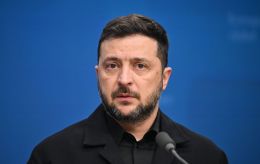Elections, Trump, ceasefire. What Ukrainian government and opposition fear and prepare for
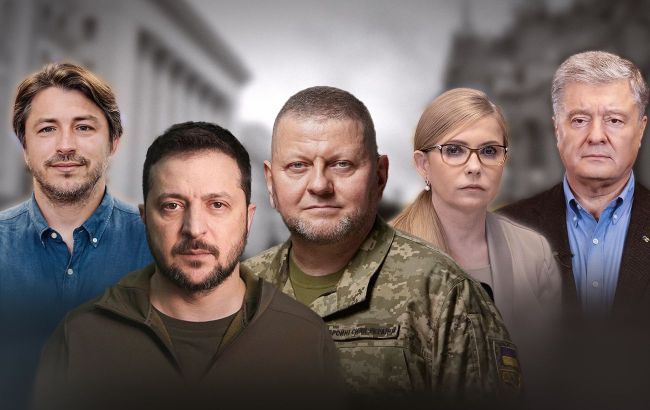 Serhii Prytula, Volodymyr Zelenskyy, Valerii Zaluzhnyi, Yulia Tymoshenko, and Petro Poroshenko (from left to right) (Photo: collage by RBC-Ukraine)
Serhii Prytula, Volodymyr Zelenskyy, Valerii Zaluzhnyi, Yulia Tymoshenko, and Petro Poroshenko (from left to right) (Photo: collage by RBC-Ukraine)
Due to the current stagnation of peace negotiations, the dates for the first post-war elections in Ukraine have been pushed from spring to fall. The issues of whether Volodymyr Zelenskyy and General Valerii Zaluzhnyi will run for election, what the current mood is in Ukraine's leading parties, and what they are preparing for are up in the air.
Contents
- Rise of Zelenskyy
- Demand for the military
- Election problems
- European Solidarity Party
- Batkivshchyna Party
- Dmytro Razumkov Party and Klitschko's UDAR
- Future of the 'blue-white camp'
- What changes could happen in the Servant of the People Party
"This is all mouse fuss – parties, elections – compared to the negotiations and conditions they will set for us. They will ultimately determine the framework in which elections will take place," said one opposition MP to RBC-Ukraine.
The next day, an identical statement was made by a prominent deputy from the ruling party. According to him, a couple of months ago, many MPs from the Servant of the People Party fell for Donald Trump's assurances about how he would end the war in Ukraine in two seconds. Now, they are facing severe frustration.
"We also have 'Trumpists' who communicate with the relevant senators and congressmen, and they were told all this. But now, senators are coming to them and asking: so what should we do, what's the plan? And everyone has understood that there is no plan from anyone," says the deputy.
Therefore, there have been noticeably fewer conversations about elections in political circles than a few months ago. Given the recent powerful attacks, to firmly believe in some kind of ceasefire, it needs to last at least a few weeks – and this isn't even on the horizon yet.
Of course, the topic of elections has not disappeared by the end, as it has been for the past three years. Moreover, the belief that Trump, through concessions or threats, can still bring about at least some real ceasefire has not disappeared either. It's just that the timelines have shifted – if earlier, the end of May was actively discussed, now fall is actively being discussed.
"Everyone is preparing for the elections, except for us." RBC-Ukraine has heard this phrase from many pro-government MPs recently. However, the President's Office is also actively keeping the topic of elections in mind – even if it is clearly not the top priority.
Rise of Zelenskyy
Trump's attacks on Volodymyr Zelenskyy in February-March led to the well-known political effect of rallying around the flag, when, during an international crisis, the level of support for a country's leader sharply increases. According to the Kyiv International Institute of Sociology polls, the trust-disapproval balance for the president grew from +20% to +41% in just a few weeks.
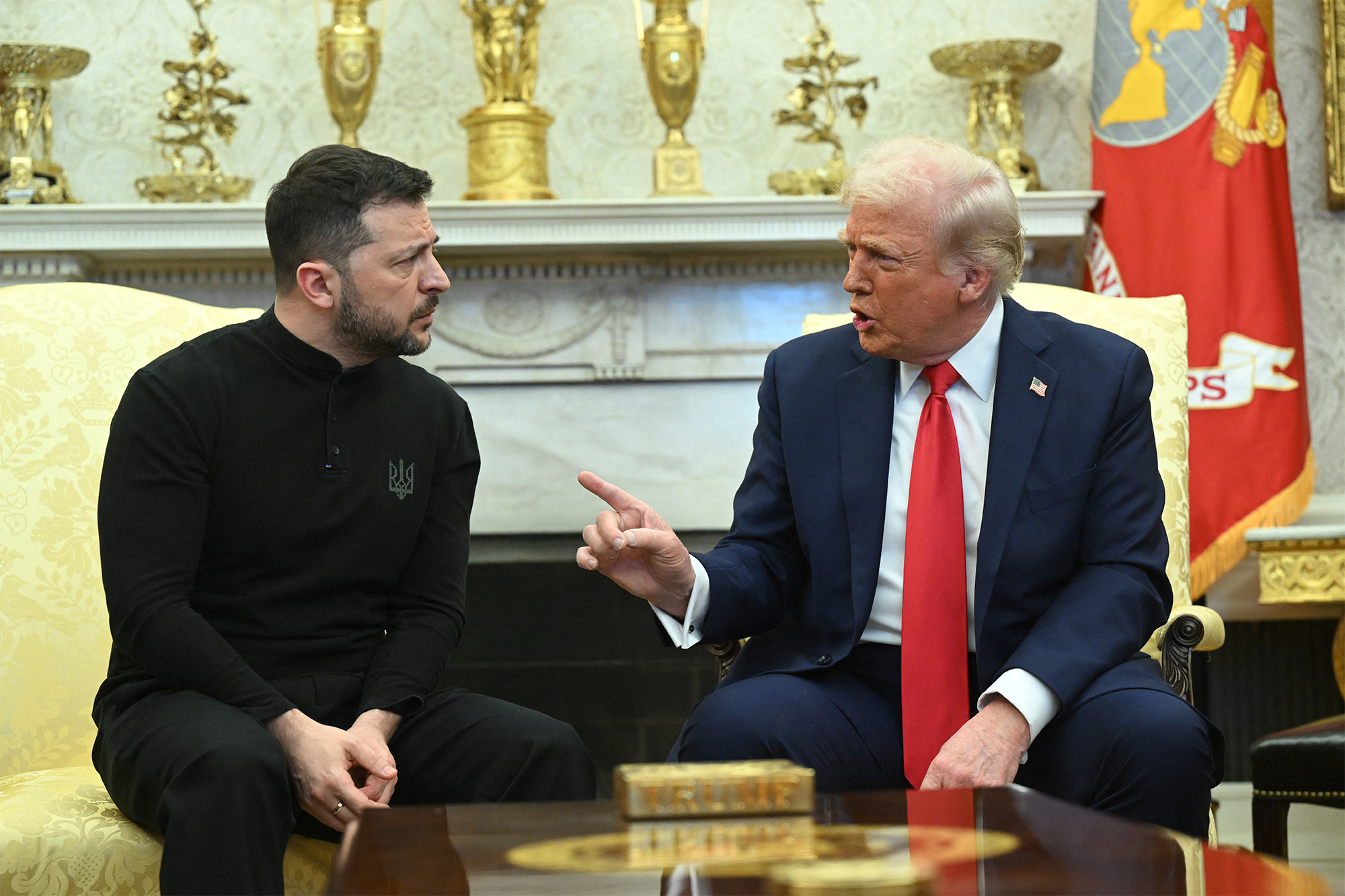
Volodymyr Zelenskyy and Donald Trump during an argument in the Oval Office (Photo: Getty Images)
Trust in a politician is not the same as their political rating, but this indicator has also noticeably improved for Zelenskyy, according to closed poll data that RBC-Ukraine was able to review. The president's rating grew so much that he began to surpass his main potential opponent, former commander-in-chief and ambassador to London Valerii Zaluzhnyi, in the first round for the first time.
However, the data from various polls differ. In one, Zelenskyy surpasses Zaluzhnyi in both the first and second rounds. In another, he leads in the first round by about 5-10% but still loses in the second. "Zaluzhnyi will win the second round due to accumulating all those dissatisfied with Zelenskyy. Zelenskyy's ceiling is currently about 35%," says an informed source to RBC-Ukraine.
Against the background of a noticeable increase in Zelenskyy's support among ordinary MPs from the Servant of the People, rumors have been circulating that in the changed situation, the President's Office will begin to push the issue of elections, trying to seize a favorable moment. And the election, as soon as the external situation allows (relative ceasefire), will be held at the fastest pace allowed by the law.
On March 30, The Economist made a resonant statement on this topic, whose sources also revealed that the Office is determined to hold elections as soon as possible, even naming specific dates – July this year (provided that a ceasefire can be achieved by April 20, Easter). However, sources within the government told RBC-Ukraine that they still consider these reports rumors and deny that any substantial preparations for snap elections have begun.
But theoretically, holding elections in accelerated mode could play into Zelenskyy's hands – potential competitors simply won’t have time to recover and launch their campaigns. Except for one, who doesn’t need a campaign launch at all – Valerii Zaluzhnyi.
Demand for the military
The participation or non-participation of Zaluzhnyi in the elections remains the main factor of uncertainty. And the former Commander-in-Chief himself is in no hurry to clarify the situation in conversations with numerous emissaries from Kyiv's political circles.
The lack of specifics always generates rumors. In the case of Zaluzhnyi, some assure that he will run in the presidential election, others claim that he leans toward running in the parliamentary elections at the head of Zelenskyy's political force, while others assert that Zaluzhnyi will not run at all – precisely because of the latest ratings.
The thing is that against the current crisis in relations with the USA and the ongoing problems caused by the Trump administration for Ukraine, the former Commander-in-Chief – unlike Zelenskyy, who is 24/7 at the center of events – has not manifested himself. The day after the scandal in the Oval Office, Zaluzhnyi posted a photo where he and Zelenskyy are shaking hands, and a few days later, he made a speech about the destruction of the "old world order." And that was essentially it.
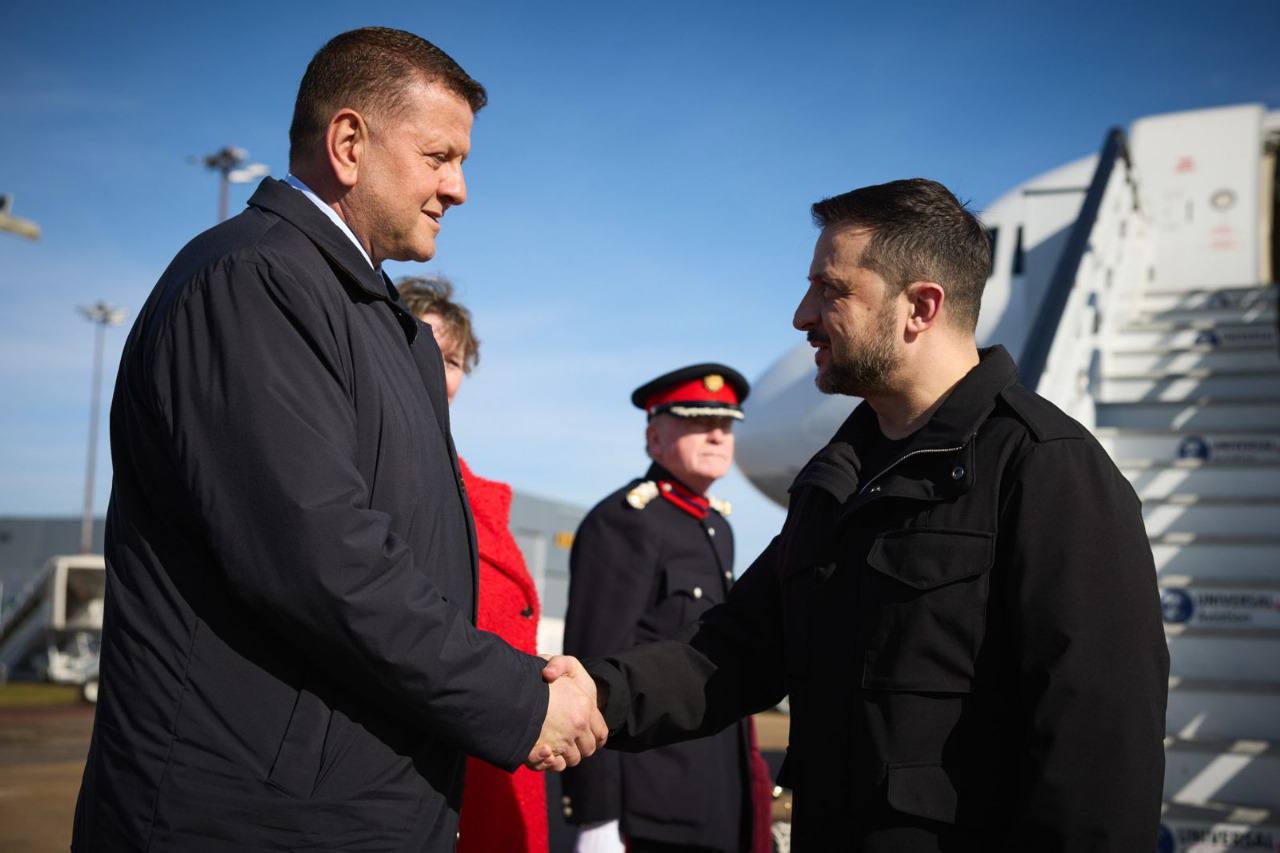
Valerii Zaluzhnyi and Volodymyr Zelenskyy
Probably, due to his physical absence from Ukraine, the former Commander-in-Chief has started to fall out of the general agenda of what the country is living through. And even with the current level of technological development, this was probably inevitable.
However, there is another opinion on this. "We have never elected presidents rationally. In fact, now there is no alternative left except Zaluzhnyi, the authorities have completely cleared the field. Zaluzhnyi absorbs the feeling of hope, and people always need hope. Like Yushchenko (3d president of Ukraine - ed.) once did," reflects one of the opposition deputies. Moreover, Zaluzhnyi has a ready-made, very attractive formula for many Ukrainians with which he could go to any election: no matter how difficult it is for us, at least we won't be ashamed.
Zaluzhnyi, when asked by RBC-Ukraine to comment on rumors that he might run in the election with Zelenskyy's party or that he might have decided not to participate in the elections at all, responded: "My answer on this has not changed. While the war continues, we all need to work on preserving the country and not think about elections. I do not comment on various rumors."
In any case, the niche for the military in politics will not remain vacant. It could be taken by the yet-to-be-formed party of Kyrylo Budanov (Ukrainian intelligence chief), a potential military project from the 3rd Assault Brigade (now already a corps), or from the Azov brigade led by Denys Prokopenko. None of them has announced plans to enter politics, although current surveys give them quite good chances.
Election problems
In any case, according to the opinion established in the political circles, the presidential elections will be held first, with the parliamentary elections following later. At the same time, local elections, as both the government and opposition say, could very well take place according to schedule – in the fall of this year, as originally planned. They may serve as a kind of test for how Ukraine, under the current circumstances, is capable of holding any elections and solving the associated problems.
The list of problems is already well known, and among them is the potential disruption of plans to hold the presidential election in blitz mode if such ideas are still attempted to be implemented. This includes complete chaos with voter registries (it is simply unknown where and how many Ukrainians live after the massive migrations during the war), destroyed infrastructure, voting by military personnel and refugees abroad, etc.
Given that millions of voters are currently abroad, their votes could completely overturn any election outcomes. However, even in the fourth year of a major war, there is no real solution for how to technically allow them to vote.
"Many say that we must, in any case, allow these people to vote because they are our people. But I think no one will particularly chase after them," says an influential deputy from the Servant of the People party. The thing is, although it is technically impossible to conduct any polls among refugees, the general opinion is that they are largely critical of the current government. This undoubtedly reduces the motivation to find any sophisticated electoral solutions for them.
Understanding how to solve the technical problems associated with elections is not even present in the Central Election Commission, although some deputies had hoped for this. But the position of the CEC during a recent communication with parliamentarians boiled down to one thing: whatever election law you pass, we will organize everything accordingly, says one of the MPs from the ruling party.
Of course, the timing of the presidential elections entirely depends on peace negotiations and the possibility of a ceasefire/peace – no one will be voting during the active phase of the war, and there is consensus on this matter.
So, in the best-case scenario, the presidential elections, as the simplest ones (few candidates, a single ballot nationwide), are expected to take place in the fall, while the parliamentary elections could be postponed until next year. In the corridors of power, March 2026 is already being mentioned.
Despite the fact that the prospects for elections are still completely unclear, informal preparations for them are still underway. Few people want to invest seriously in elections right now and then wait for the return on investment for an indefinitely long period.
European Solidarity Party
The most prominent opposition political force, the European Solidarity Party (ЕS), has recently focused on two main areas: fighting the sanctions imposed on their leader, Petro Poroshenko, and criticizing the government's handling of negotiations with the Americans.
The unexpected imposition of sanctions against Poroshenko did not cause as much of a stir in Europe as his allies likely hoped. This is not surprising – the European Union currently has too many other concerns, and any criticism of Ukraine in the current geopolitical context seems inappropriate to Europeans. However, the ES continues its fight on the domestic front, having gathered 145,000 signatures calling for the lifting of sanctions against Poroshenko.
A source from his faction told RBC-Ukraine that the sanction and criminal pressure on Poroshenko could serve several purposes: ultimately, to seize his assets, complicate his ability to finance any elections, and also to occupy his time and energy with legal battles instead of purely political activities. The possibility that Poroshenko might eventually end up behind bars is considered quite likely by his party, and this view is shared by sources from the Servant of the People party.
In addition, the ЕS is confident that on the most important foreign policy track, in negotiations with the Americans about peace or a ceasefire, the government is making mistake after mistake, which will ultimately corner Ukraine. "The freeze that everything is heading towards will be worse by all parameters than the Minsk agreements were for us. And the government has criticized Minsk so many times over the years that this kind of option triggers them very strongly," reflects a deputy from the ЕS.
Batkivshchyna Party
Several interlocutors from various political forces unanimously told RBC-Ukraine that the topic of elections in Ukraine is being most actively promoted by Yulia Tymoshenko. She is even allegedly looking for disillusioned deputies from other factions in the halls, offering them to join the Batkivshchyna (Fatherland) Party. In the party itself, they say that they are ready to consider the candidacies of anyone interested, should such individuals appear, but they are not actively poaching anyone.
"According to the agreements reached between the political forces within the framework of the Jean Monnet dialogues, the vote can take place no earlier than six months after the cancellation of martial law. Another important issue in this regard is financing. According to the calculations we have, holding the elections alone will cost about 3.5 billion hryvnias (approx $84,4 mln). In our opinion, for the sake of economy, we should hold three elections simultaneously – presidential, parliamentary, and local," says one of the representatives of the Batkivshchyna Party to RBC-Ukraine.
However, the issue of saving money in this case is secondary, and the government will not go for holding all three elections at once – it's too risky. If Russia decides to break the ceasefire and start a new offensive just before the voting day, the scale of the domestic political chaos in such a case is hard to even imagine.
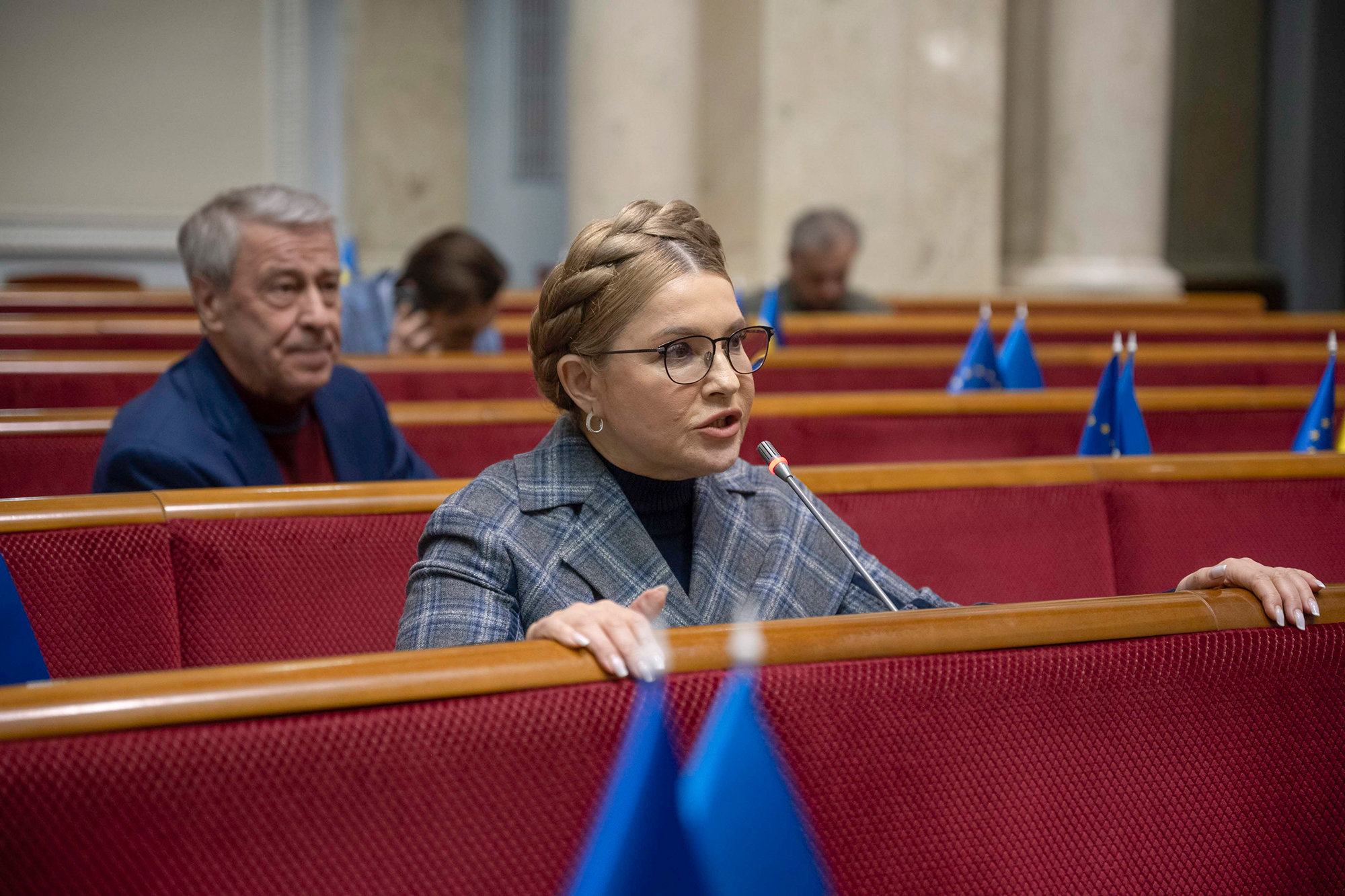
Yulia Tymoshenko (Photo: Getty Images)
At the same time, several sources in the political sphere note that recently, the Batkivshchyna has become close to the President's Office and is synchronizing its actions and statements with it. This became especially noticeable after Tymoshenko defended Zelenskyy when Trump called him a "dictator." However, it should be noted that other politicians also voiced support for the Ukrainian President at that time. In the Batkivshchyna itself, they deny playing into the hands of the Office and claim that they are ready to support Zelenskyy if he takes "correct steps." Meanwhile, rumors are circulating in the corridors of power that Tymoshenko could become a transitional prime minister. But it is not hard to guess who is spreading these rumors.
Dmytro Razumkov Party and Klitschko's UDAR
Tymoshenko's electoral field somewhat overlaps with the electoral field of former Verkhovna Rada Speaker Dmytro Razumkov, whose rating is currently at the level of the electoral threshold. According to sources in the Servant of the People Party, immediately after his removal from the position of speaker in October 2021, a regional network of various dissatisfied local party members grouped around Razumkov, and now he is allegedly trying to revive it. Additionally, the former speaker and his associates have been actively traveling to regions lately, which has fueled rumors about their preparations for elections.
"The rumors that we have started preparing for elections can only be explained by our recent trips to the western regions. Indeed, there was a delegation of five MPs. But this is not related to election preparations - we are just alternating trips to the front line and to the rear regions," one of Razumkov's team members tells RBC-Ukraine.
Talks about the future and the format of participation in politics have also intensified within the team of Kyiv Mayor Vitali Klitschko, who has been somewhat battered by recent criminal cases. At the moment, the UDAR party's public activity is focused on the charitable foundation "Ukrainian Team." However, a source close to the mayor says that UDAR is unlikely to undergo any significant rebranding.
"Our basic scenario is that negotiations fail, and elections won't take place this year. As for local elections, if they don’t occur on schedule, there are certain nuances. This is because the law regulates the legitimacy of the president and the parliament after their term ends during martial law, but it doesn't regulate the powers of local authorities," say sources close to Klitschko.
The legislation states that elections to local councils, village heads, or mayors cannot be held during martial law. However, there is no mention of the possibility that local authorities can continue their powers until new elections, as is provided for the president and parliament.
This means that the term of all current local authorities will end in December this year. If local elections are not held in the fall and the Verkhovna Rada (Ukrainian parliament) does not come up with a legal formula by then to ensure their legitimacy, the Presidential Office will have to establish military administrations in local areas. This, according to a source close to Klitschko, brings its own risks to local self-government.
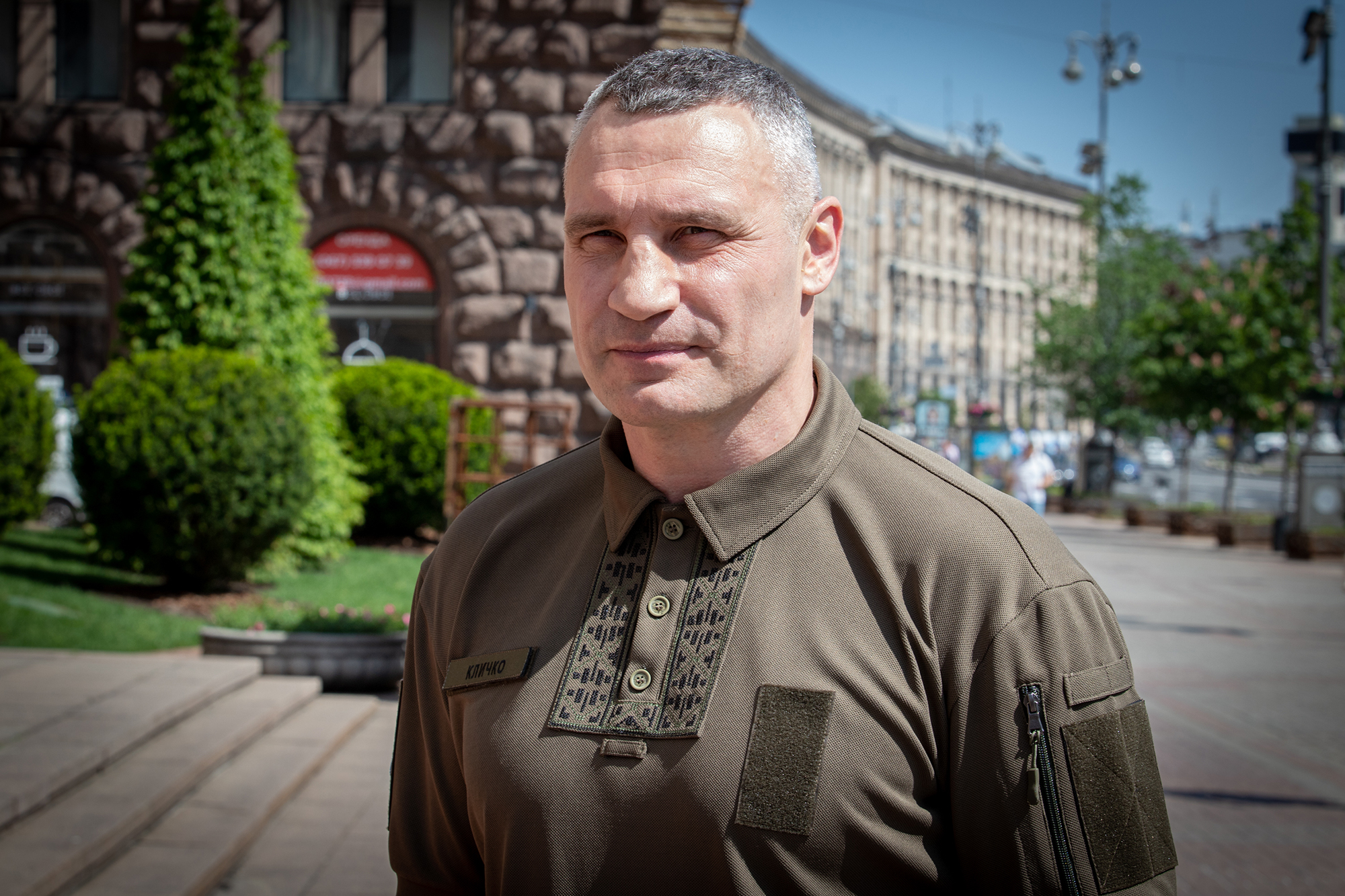
Vitali Klitschko (Photo: Getty Images)
In the political sphere, it is said that the Kyiv mayor is once again trying to establish horizontal relationships with various local elites, such as Borys Filatov from Dnipro and former Prime Minister Volodymyr Groysman, who traditionally has strong positions in Vinnytsia. However, a source close to Klitschko claims that such a setup was relevant five years ago when the idea of creating a "party of mayors" was born - but it didn’t work out. "For the future, this is theoretically not to be ruled out. But so far, there are no ongoing negotiations with anyone," he says.
Future of the 'blue-white camp'
The former Opposition Platform – For Life is also considering its political renewal for another cycle, as its electoral field has not disappeared, despite all the events of recent years. However, the understanding of its future is still unclear.
Earlier, there were discussions about the possibility of forming a new party for the parliamentary elections, with one of the current MPs – Yurii Pavlenko – at the helm.
"Pavlenko is also a current military figure, with a reputation as a pro-Ukrainian politician. But he will need a lot of time to build up his profile. So, most likely, if such a party is formed, it will be led by Boyko (Yuriy Boyko - Ed.)," says a source from the party.
The political uncertainty of the so-called "white-blue camp" is tied not only to what public sympathies and demands will be at the time the electoral campaign begins but also to when these elections will take place.
"Even though the negotiation process seems to be drawn out now, it could move much faster later on. Therefore, I am inclined to believe that we will reach some ceasefire in the not-too-distant future. Moreover, I think that starting from May, we will see an intensification of the pre-election processes," say sources from the party.
According to their estimates, the first elections – both presidential and parliamentary – could take place later this year. However, they are likely to occur between a ceasefire and the formal end of the war, as Russia may push for this, along with the United States. In principle, Vladimir Putin's recent statements about the introduction of external governance in Ukraine to conduct elections here align with this concept.
What changes could happen in the Servant of the People Party
The ruling Servant of the People Party also assures that it is not preparing for the elections but does have certain outlines regarding its future parliamentary list. Naturally, everything depends on whether Zelenskyy himself decides to run in the elections and, if so, whether he can win. For now, his inner circle insists that the Office has no "Plan B" in case the polls show that Zaluzhnyi would win in the second round.
"Many people here say that in any case it would be worth going to the elections, and even if we don’t win, at least we could give momentum for the parliamentary ones and eventually get a good faction. Although I don’t see a desire at Bankova (the President's Office, figuratively - Ed.) to get involved in anything unless it’s to win," an MP from the Servant of the People party told RBC-Ukraine.
Members of the Servant of the People Party, from various internal factions, confirm that Zelenskyy's party list in the elections will be a mix of 5–10 top MPs from the current convocation, people close to Andriy Yermak, President's Office Head, volunteers and military personnel, various opinion leaders and celebrities from different fields. One source even compared this list to the Our Ukraine Party of 2006, where, along with businessmen and "dear friends," singers and writers sat in the parliament.
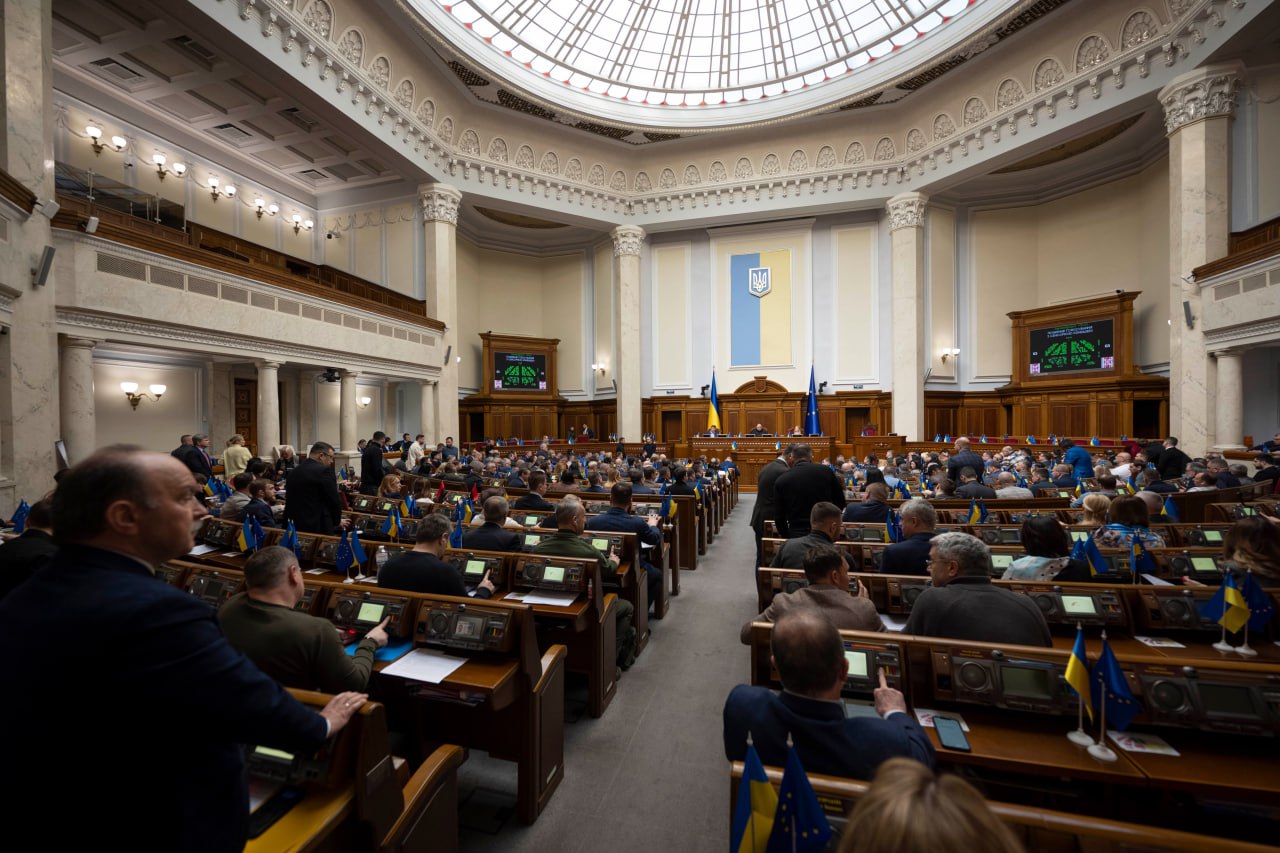 Meeting of the Verkhovna Rada (Photo: t.me/verkhovnaradaukrainy)
Meeting of the Verkhovna Rada (Photo: t.me/verkhovnaradaukrainy)
According to a prominent MP from the Servant of the People party, at its peak, it could gain up to 30% under the most favorable conditions. That is not enough to form a single-party majority, so they will have to look for partners. For now, the most likely is the potential political project of well-known volunteer Serhii Prytula – various "servants" also agree on this point.
On the other hand, the main idea of the campaign is more or less clear. Promising the return of territories occupied by Russia is, a priori, an unlikely goal in the short- or medium-term perspective, so the party will focus on something more achievable – joining the EU.
"We will lead you to the European Union – this is essentially the only big idea that can resonate with people. Like Poroshenko in 2014 promised to end the war," says one of the MPs from the Servant of the People Party.
However, he adds, right now, elections have taken a backseat even in conversations between MPs – everyone is concerned with what worries the rest of Ukrainians: what will our future be, how long will this conditional peace or truce last, and what plans can be made.
Indeed, it is completely unclear whether it will even be possible to reach any kind of stable peace deal with the aggressors. Or whether, like in Korea, there will be a truce that lasts for decades, potentially breakable at any moment.
"And the main question: do we even have a future at all?" concludes the MP from the party.

